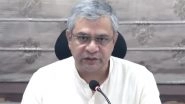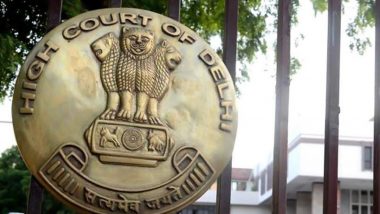New Delhi, July 8: The Delhi High Court on Friday asked the Enforcement Directorate (ED) to decide on Vivo India's (petitioner) representation seeking permission to operate its bank accounts which were recently frozen in connection with a money laundering case.
The Bench of Justice Yashwant Varma on Friday also asked ED's counsel to obtain instructions on grievances and the issues raised in the petition and kept the matter for 23 July 2022 for the next hearing.
Senior Advocate Siddharth Luthra submitted "We have 9,000 employees. There is a liability, freezing its accounts would lead to the company's 'civil death'," Luthra submitted. Vivo India's counsel submitted, "grave injustice will be caused to the company and will negatively impact on the reputation and business operations of the company."
The freezing of the bank accounts will not only impede the existing/prospective business operations of the petitioner conducted through the bank accounts but will also bear an adverse effect on the Petitioner's operations in India and across the globe, said the petition. ED Raids at Vivo: Companies Who Operate in India Need to Follow Law of the Land, Says MEA.
If amounts in the Petitioner's bank accounts remain frozen, it would not be able to pay its statutory dues to the competent authorities under various enactments, leading to the Petitioner being in further violation of the law. The freezing will also prevent the payment of salaries to the thousands of employees of the Petitioner.
Vivo India on Friday approached the Delhi High Court challenging the freezing of the company's bank account by the Enforcement Directorate (ED) in connection with a money laundering case.
ED in its statement had said that all due procedures as per the law were followed during the said operations at each premise. "The employees of Vivo India, including some Chinese nationals, did not cooperate with the search proceedings and had tried to abscond, remove and hide digital devices which were retrieved by the search," it added.
According to the ED, Vivo India's nearly 23 associated firms such as Grand Prospect International Communication Pvt Ltd (GPICPL) transferred huge amounts to the firm and out of the total sale proceeds of Rs 1,25,185 crores, it remitted Rs 62,476 crores-- almost 50 per cent of the turnover-- out of India, mainly to China.
"These companies are found to have transferred huge amounts of funds to Vivo India. Further, out of the total sale proceeds of Rs 1,25,185 crores, Vivo India remitted Rs 62,476 crores almost 50 per cent of the turnover out of India, mainly to China," ED said in a statement.
These remittances were made in order to disclose huge losses in Indian incorporated companies to avoid payment of taxes in India. The ED in its statement revealed the information after it carried out a search at 48 locations spanning the country belonging to Vivo Mobiles India Private Limited and its 23 associated companies such as GPICPL.
The agency said these entities are Rui Chuang Technologies Private Limited (Ahmedabad), V Dream Technology and Communication Private Ltd (Hyderabad), Regenvo Mobile Private Limited (Lucknow), Fangs Technology Private Limited (Chennai), Weiwo Communication Private Limited (Bangalore), Bubugao Communication Private Limited (Jaipur), Haicheng Mobile (India) Private Limited (New Delhi), Joinmay Mumbai Electronics Pvt Ltd (Mumbai), Yingjia Communication Private Limited (Kolkata), Jie Lian Mobile India Pvt Ltd (Indore), Vigour Mobile India Private Limited (Gurgaon), Hisoa Electronic Private Limited (Pune), Haijin Trade India Private Limited (Kochi), Rongsheng Mobile India Private Limited (Guwahati), Morefun Communication Private Limited (Patna), Aohua Mobile India Private Limited (Raipur), Pioneer Mobile Private Limited (Bhubaneswar), Unimay Electronic Private Limited (Nagpur), Junwei Electronic Private Limited (Aurangabad), Huijin Electronic India Private Limited (Ranchi), MGM Sales Private Limited (Dehradun) and Joinmay Electronics Pvt Ltd (Mumbai).
ED said Vivo Mobiles India Pvt Ltd was incorporated on 1 August 2014, as a subsidiary of Multi Accord Ltd, a Hong Kong-based company and was registered at the Registrar of Companies in New Delhi. It further said GPICPL was registered on 3 December 2014, at Registrar of Companies, Shimla, with registered addresses of Solan in Himachal Pradesh and Gandhi Nagar in Jammu.
The company was incorporated by Zhengshen Ou, Bin Lou and Zhang Jie with the help of Nitin Garg, a Chartered Accountant. Bin Lou left India on 26 April 2018, while Zhengshen Ou and Zhang Jie left India in 2021.
PMLA Investigation by ED was initiated by recording an Enforcement Case Information Report (ECIR) on February 3 this year on the basis of a First Information Report (FIR) registered by Kalkaji police station under Delhi Police on December 5 last year against GPICPL and its Director, shareholders and certifying professionals on the basis of a complaint filed by Ministry of Corporate Affairs.
As per the FIR, GPICPL and its shareholders had used forged identification documents and falsified addresses at the time of incorporation. The allegations were found to be true as the investigation revealed that the addresses mentioned by the directors of GPICPL did not belong to them, but in fact, were a government building and the house also belonged to a senior bureaucrat. China Slams ED Raids at Vivo and Other Chinese Firms, Says ‘It Will Chill Investment Confidence’.
ED's investigation further revealed that the same director of GPICPL, namely Bin Lou, was also an ex-director of Vivo. He (Lou) had incorporated multiple companies across the country spread across various states, a total of 18 companies around the same time, just after the incorporation of Vivo in 2014-15 and further another Chinese national Zhixin Wei had incorporated another four companies.
So far, the ED said, 119 bank accounts of various entities with a gross balance to the tune of Rs 465 crores including Fixed Deposits to the tune of 66 crores of Vivo India, 2 kg gold bars, and cash amount to the tune of approximately Rs 73 lakhs have been seized under the provisions of PMLA, 2002.
(The above story is verified and authored by ANI staff, ANI is South Asia's leading multimedia news agency with over 100 bureaus in India, South Asia and across the globe. ANI brings the latest news on Politics and Current Affairs in India & around the World, Sports, Health, Fitness, Entertainment, & News. The views appearing in the above post do not reflect the opinions of LatestLY)













 Quickly
Quickly


